Analysing Organisational Behaviour: A Case Study of the BBC Report
VerifiedAdded on 2020/07/23
|15
|4259
|30
Report
AI Summary
This report provides an in-depth analysis of organisational behaviour within the BBC, examining the influence of culture, power, and politics on employee conduct and team dynamics. It explores the historical organisational culture, identifies different types of cultures, and assesses how these elements have affected individual and team behaviour. The report delves into motivational theories, including content and process theories, and evaluates techniques to enhance team effectiveness within the BBC. Furthermore, it discusses the impact of improved motivation on achieving organisational goals and examines various team types and development strategies. The report concludes by applying the "Path Goal" organisational theory to improve team performance and identifies barriers to effective performance within the BBC.
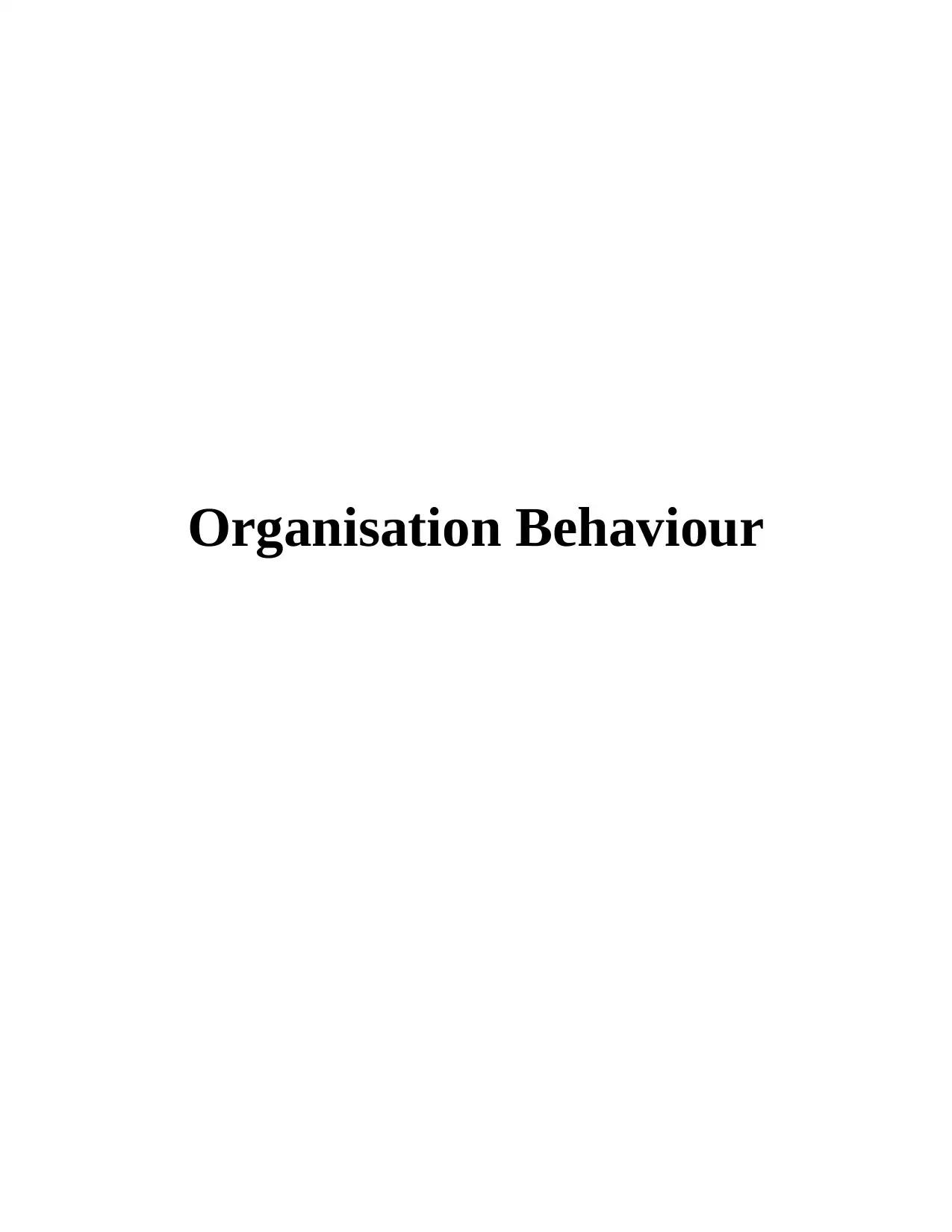
Organisation Behaviour
Paraphrase This Document
Need a fresh take? Get an instant paraphrase of this document with our AI Paraphraser

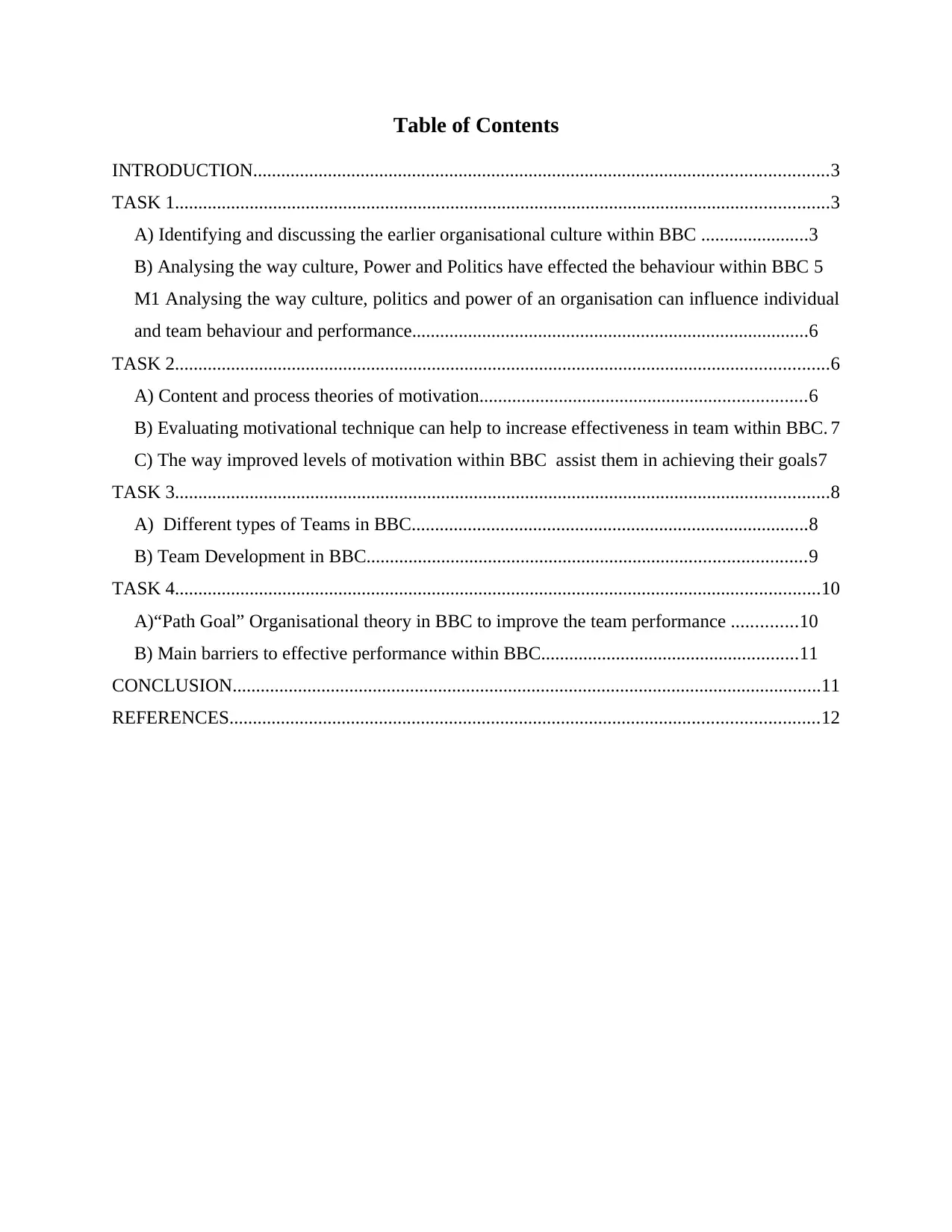
Table of Contents
INTRODUCTION...........................................................................................................................3
TASK 1............................................................................................................................................3
A) Identifying and discussing the earlier organisational culture within BBC .......................3
B) Analysing the way culture, Power and Politics have effected the behaviour within BBC 5
M1 Analysing the way culture, politics and power of an organisation can influence individual
and team behaviour and performance.....................................................................................6
TASK 2............................................................................................................................................6
A) Content and process theories of motivation......................................................................6
B) Evaluating motivational technique can help to increase effectiveness in team within BBC. 7
C) The way improved levels of motivation within BBC assist them in achieving their goals7
TASK 3............................................................................................................................................8
A) Different types of Teams in BBC.....................................................................................8
B) Team Development in BBC..............................................................................................9
TASK 4..........................................................................................................................................10
A)“Path Goal” Organisational theory in BBC to improve the team performance ..............10
B) Main barriers to effective performance within BBC.......................................................11
CONCLUSION..............................................................................................................................11
REFERENCES..............................................................................................................................12
INTRODUCTION...........................................................................................................................3
TASK 1............................................................................................................................................3
A) Identifying and discussing the earlier organisational culture within BBC .......................3
B) Analysing the way culture, Power and Politics have effected the behaviour within BBC 5
M1 Analysing the way culture, politics and power of an organisation can influence individual
and team behaviour and performance.....................................................................................6
TASK 2............................................................................................................................................6
A) Content and process theories of motivation......................................................................6
B) Evaluating motivational technique can help to increase effectiveness in team within BBC. 7
C) The way improved levels of motivation within BBC assist them in achieving their goals7
TASK 3............................................................................................................................................8
A) Different types of Teams in BBC.....................................................................................8
B) Team Development in BBC..............................................................................................9
TASK 4..........................................................................................................................................10
A)“Path Goal” Organisational theory in BBC to improve the team performance ..............10
B) Main barriers to effective performance within BBC.......................................................11
CONCLUSION..............................................................................................................................11
REFERENCES..............................................................................................................................12
⊘ This is a preview!⊘
Do you want full access?
Subscribe today to unlock all pages.

Trusted by 1+ million students worldwide
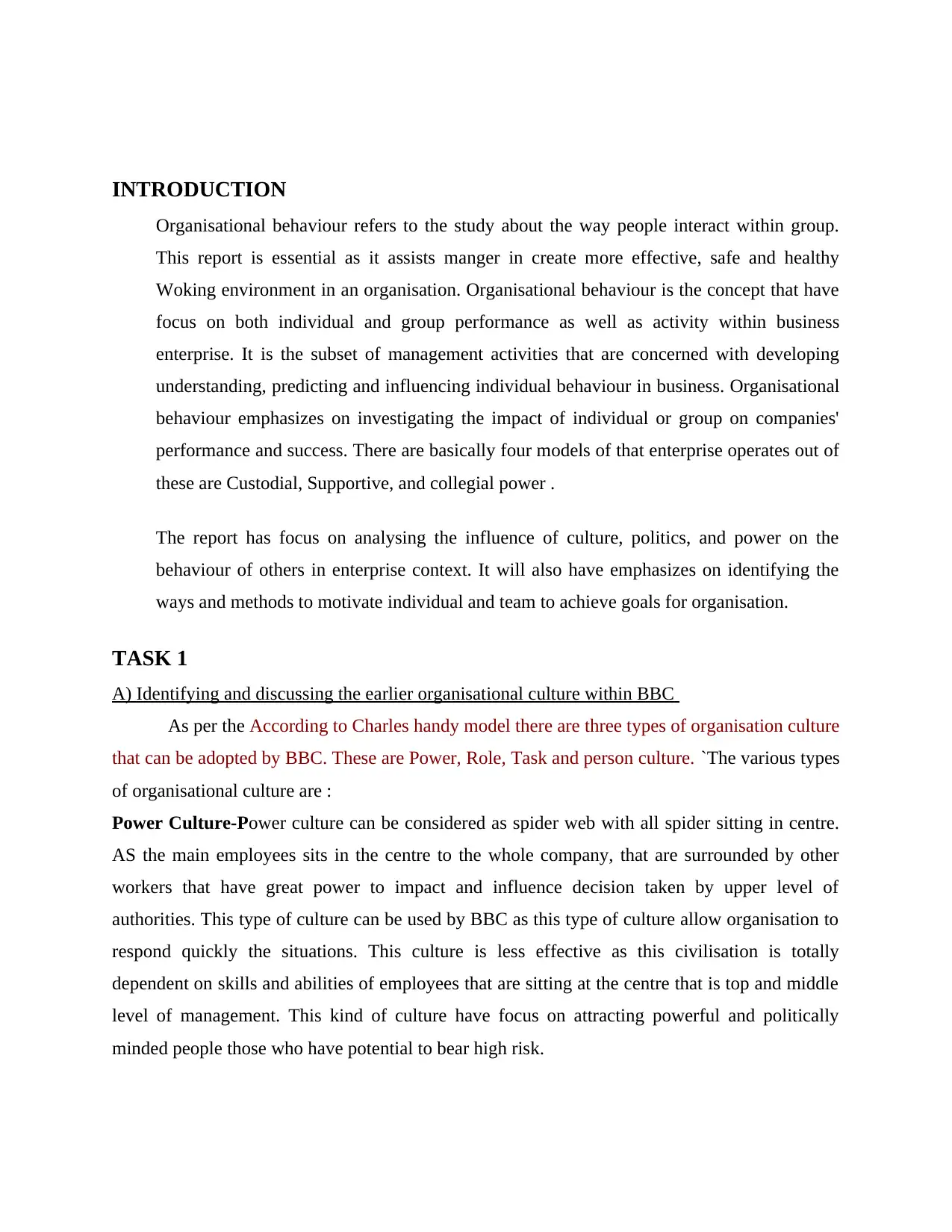
INTRODUCTION
Organisational behaviour refers to the study about the way people interact within group.
This report is essential as it assists manger in create more effective, safe and healthy
Woking environment in an organisation. Organisational behaviour is the concept that have
focus on both individual and group performance as well as activity within business
enterprise. It is the subset of management activities that are concerned with developing
understanding, predicting and influencing individual behaviour in business. Organisational
behaviour emphasizes on investigating the impact of individual or group on companies'
performance and success. There are basically four models of that enterprise operates out of
these are Custodial, Supportive, and collegial power .
The report has focus on analysing the influence of culture, politics, and power on the
behaviour of others in enterprise context. It will also have emphasizes on identifying the
ways and methods to motivate individual and team to achieve goals for organisation.
TASK 1
A) Identifying and discussing the earlier organisational culture within BBC
As per the According to Charles handy model there are three types of organisation culture
that can be adopted by BBC. These are Power, Role, Task and person culture. `The various types
of organisational culture are :
Power Culture-Power culture can be considered as spider web with all spider sitting in centre.
AS the main employees sits in the centre to the whole company, that are surrounded by other
workers that have great power to impact and influence decision taken by upper level of
authorities. This type of culture can be used by BBC as this type of culture allow organisation to
respond quickly the situations. This culture is less effective as this civilisation is totally
dependent on skills and abilities of employees that are sitting at the centre that is top and middle
level of management. This kind of culture have focus on attracting powerful and politically
minded people those who have potential to bear high risk.
Organisational behaviour refers to the study about the way people interact within group.
This report is essential as it assists manger in create more effective, safe and healthy
Woking environment in an organisation. Organisational behaviour is the concept that have
focus on both individual and group performance as well as activity within business
enterprise. It is the subset of management activities that are concerned with developing
understanding, predicting and influencing individual behaviour in business. Organisational
behaviour emphasizes on investigating the impact of individual or group on companies'
performance and success. There are basically four models of that enterprise operates out of
these are Custodial, Supportive, and collegial power .
The report has focus on analysing the influence of culture, politics, and power on the
behaviour of others in enterprise context. It will also have emphasizes on identifying the
ways and methods to motivate individual and team to achieve goals for organisation.
TASK 1
A) Identifying and discussing the earlier organisational culture within BBC
As per the According to Charles handy model there are three types of organisation culture
that can be adopted by BBC. These are Power, Role, Task and person culture. `The various types
of organisational culture are :
Power Culture-Power culture can be considered as spider web with all spider sitting in centre.
AS the main employees sits in the centre to the whole company, that are surrounded by other
workers that have great power to impact and influence decision taken by upper level of
authorities. This type of culture can be used by BBC as this type of culture allow organisation to
respond quickly the situations. This culture is less effective as this civilisation is totally
dependent on skills and abilities of employees that are sitting at the centre that is top and middle
level of management. This kind of culture have focus on attracting powerful and politically
minded people those who have potential to bear high risk.
Paraphrase This Document
Need a fresh take? Get an instant paraphrase of this document with our AI Paraphraser
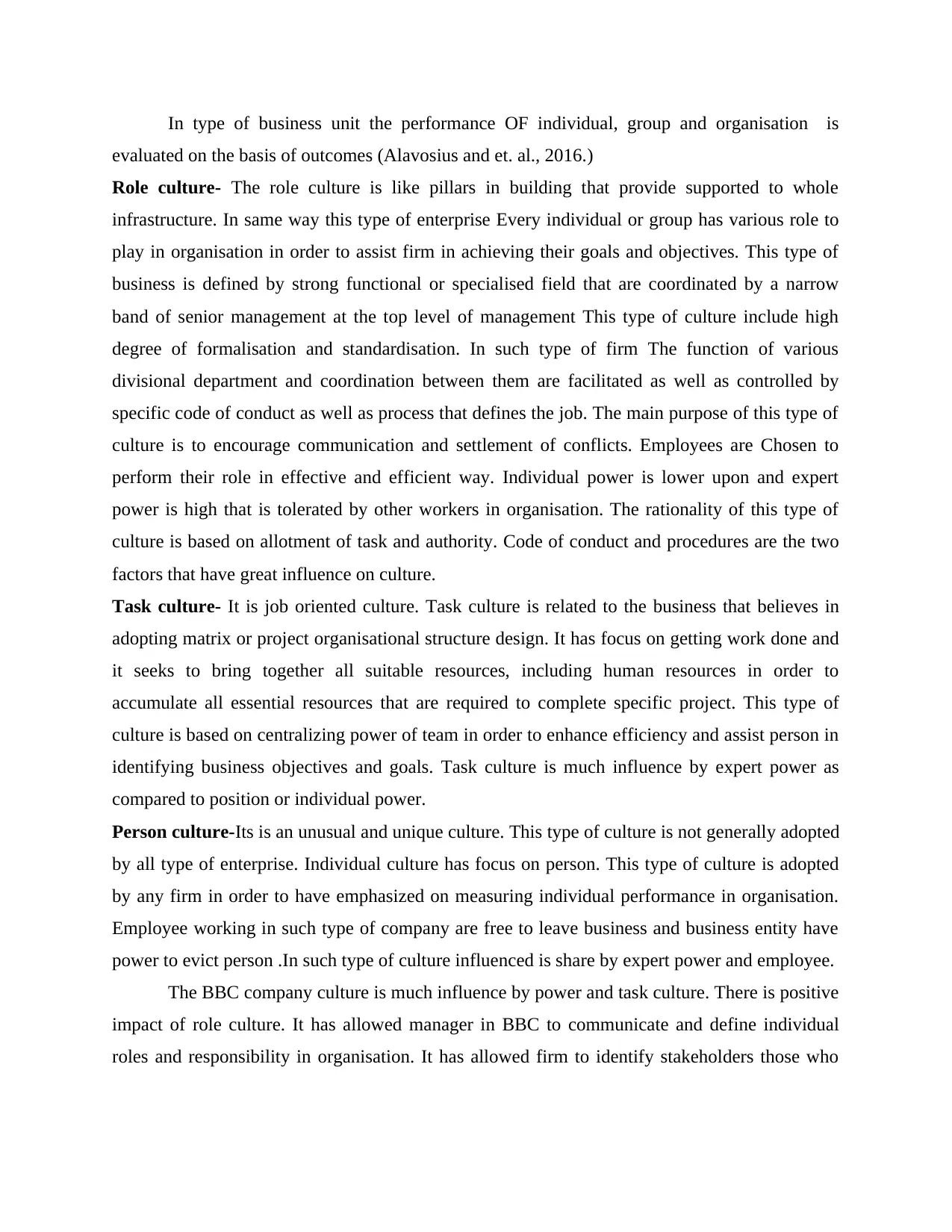
In type of business unit the performance OF individual, group and organisation is
evaluated on the basis of outcomes (Alavosius and et. al., 2016.)
Role culture- The role culture is like pillars in building that provide supported to whole
infrastructure. In same way this type of enterprise Every individual or group has various role to
play in organisation in order to assist firm in achieving their goals and objectives. This type of
business is defined by strong functional or specialised field that are coordinated by a narrow
band of senior management at the top level of management This type of culture include high
degree of formalisation and standardisation. In such type of firm The function of various
divisional department and coordination between them are facilitated as well as controlled by
specific code of conduct as well as process that defines the job. The main purpose of this type of
culture is to encourage communication and settlement of conflicts. Employees are Chosen to
perform their role in effective and efficient way. Individual power is lower upon and expert
power is high that is tolerated by other workers in organisation. The rationality of this type of
culture is based on allotment of task and authority. Code of conduct and procedures are the two
factors that have great influence on culture.
Task culture- It is job oriented culture. Task culture is related to the business that believes in
adopting matrix or project organisational structure design. It has focus on getting work done and
it seeks to bring together all suitable resources, including human resources in order to
accumulate all essential resources that are required to complete specific project. This type of
culture is based on centralizing power of team in order to enhance efficiency and assist person in
identifying business objectives and goals. Task culture is much influence by expert power as
compared to position or individual power.
Person culture-Its is an unusual and unique culture. This type of culture is not generally adopted
by all type of enterprise. Individual culture has focus on person. This type of culture is adopted
by any firm in order to have emphasized on measuring individual performance in organisation.
Employee working in such type of company are free to leave business and business entity have
power to evict person .In such type of culture influenced is share by expert power and employee.
The BBC company culture is much influence by power and task culture. There is positive
impact of role culture. It has allowed manager in BBC to communicate and define individual
roles and responsibility in organisation. It has allowed firm to identify stakeholders those who
evaluated on the basis of outcomes (Alavosius and et. al., 2016.)
Role culture- The role culture is like pillars in building that provide supported to whole
infrastructure. In same way this type of enterprise Every individual or group has various role to
play in organisation in order to assist firm in achieving their goals and objectives. This type of
business is defined by strong functional or specialised field that are coordinated by a narrow
band of senior management at the top level of management This type of culture include high
degree of formalisation and standardisation. In such type of firm The function of various
divisional department and coordination between them are facilitated as well as controlled by
specific code of conduct as well as process that defines the job. The main purpose of this type of
culture is to encourage communication and settlement of conflicts. Employees are Chosen to
perform their role in effective and efficient way. Individual power is lower upon and expert
power is high that is tolerated by other workers in organisation. The rationality of this type of
culture is based on allotment of task and authority. Code of conduct and procedures are the two
factors that have great influence on culture.
Task culture- It is job oriented culture. Task culture is related to the business that believes in
adopting matrix or project organisational structure design. It has focus on getting work done and
it seeks to bring together all suitable resources, including human resources in order to
accumulate all essential resources that are required to complete specific project. This type of
culture is based on centralizing power of team in order to enhance efficiency and assist person in
identifying business objectives and goals. Task culture is much influence by expert power as
compared to position or individual power.
Person culture-Its is an unusual and unique culture. This type of culture is not generally adopted
by all type of enterprise. Individual culture has focus on person. This type of culture is adopted
by any firm in order to have emphasized on measuring individual performance in organisation.
Employee working in such type of company are free to leave business and business entity have
power to evict person .In such type of culture influenced is share by expert power and employee.
The BBC company culture is much influence by power and task culture. There is positive
impact of role culture. It has allowed manager in BBC to communicate and define individual
roles and responsibility in organisation. It has allowed firm to identify stakeholders those who
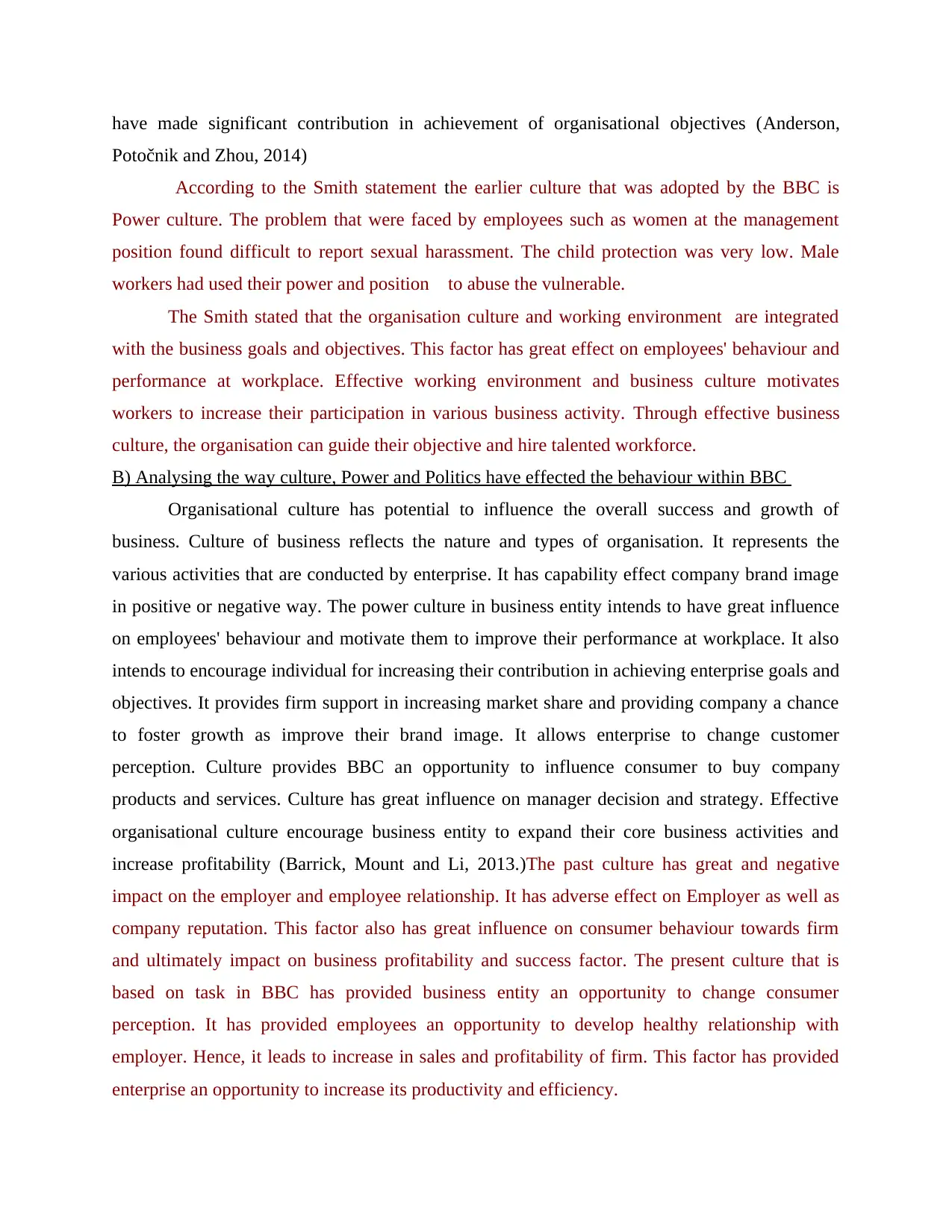
have made significant contribution in achievement of organisational objectives (Anderson,
Potočnik and Zhou, 2014)
According to the Smith statement the earlier culture that was adopted by the BBC is
Power culture. The problem that were faced by employees such as women at the management
position found difficult to report sexual harassment. The child protection was very low. Male
workers had used their power and position to abuse the vulnerable.
The Smith stated that the organisation culture and working environment are integrated
with the business goals and objectives. This factor has great effect on employees' behaviour and
performance at workplace. Effective working environment and business culture motivates
workers to increase their participation in various business activity. Through effective business
culture, the organisation can guide their objective and hire talented workforce.
B) Analysing the way culture, Power and Politics have effected the behaviour within BBC
Organisational culture has potential to influence the overall success and growth of
business. Culture of business reflects the nature and types of organisation. It represents the
various activities that are conducted by enterprise. It has capability effect company brand image
in positive or negative way. The power culture in business entity intends to have great influence
on employees' behaviour and motivate them to improve their performance at workplace. It also
intends to encourage individual for increasing their contribution in achieving enterprise goals and
objectives. It provides firm support in increasing market share and providing company a chance
to foster growth as improve their brand image. It allows enterprise to change customer
perception. Culture provides BBC an opportunity to influence consumer to buy company
products and services. Culture has great influence on manager decision and strategy. Effective
organisational culture encourage business entity to expand their core business activities and
increase profitability (Barrick, Mount and Li, 2013.)The past culture has great and negative
impact on the employer and employee relationship. It has adverse effect on Employer as well as
company reputation. This factor also has great influence on consumer behaviour towards firm
and ultimately impact on business profitability and success factor. The present culture that is
based on task in BBC has provided business entity an opportunity to change consumer
perception. It has provided employees an opportunity to develop healthy relationship with
employer. Hence, it leads to increase in sales and profitability of firm. This factor has provided
enterprise an opportunity to increase its productivity and efficiency.
Potočnik and Zhou, 2014)
According to the Smith statement the earlier culture that was adopted by the BBC is
Power culture. The problem that were faced by employees such as women at the management
position found difficult to report sexual harassment. The child protection was very low. Male
workers had used their power and position to abuse the vulnerable.
The Smith stated that the organisation culture and working environment are integrated
with the business goals and objectives. This factor has great effect on employees' behaviour and
performance at workplace. Effective working environment and business culture motivates
workers to increase their participation in various business activity. Through effective business
culture, the organisation can guide their objective and hire talented workforce.
B) Analysing the way culture, Power and Politics have effected the behaviour within BBC
Organisational culture has potential to influence the overall success and growth of
business. Culture of business reflects the nature and types of organisation. It represents the
various activities that are conducted by enterprise. It has capability effect company brand image
in positive or negative way. The power culture in business entity intends to have great influence
on employees' behaviour and motivate them to improve their performance at workplace. It also
intends to encourage individual for increasing their contribution in achieving enterprise goals and
objectives. It provides firm support in increasing market share and providing company a chance
to foster growth as improve their brand image. It allows enterprise to change customer
perception. Culture provides BBC an opportunity to influence consumer to buy company
products and services. Culture has great influence on manager decision and strategy. Effective
organisational culture encourage business entity to expand their core business activities and
increase profitability (Barrick, Mount and Li, 2013.)The past culture has great and negative
impact on the employer and employee relationship. It has adverse effect on Employer as well as
company reputation. This factor also has great influence on consumer behaviour towards firm
and ultimately impact on business profitability and success factor. The present culture that is
based on task in BBC has provided business entity an opportunity to change consumer
perception. It has provided employees an opportunity to develop healthy relationship with
employer. Hence, it leads to increase in sales and profitability of firm. This factor has provided
enterprise an opportunity to increase its productivity and efficiency.
⊘ This is a preview!⊘
Do you want full access?
Subscribe today to unlock all pages.

Trusted by 1+ million students worldwide
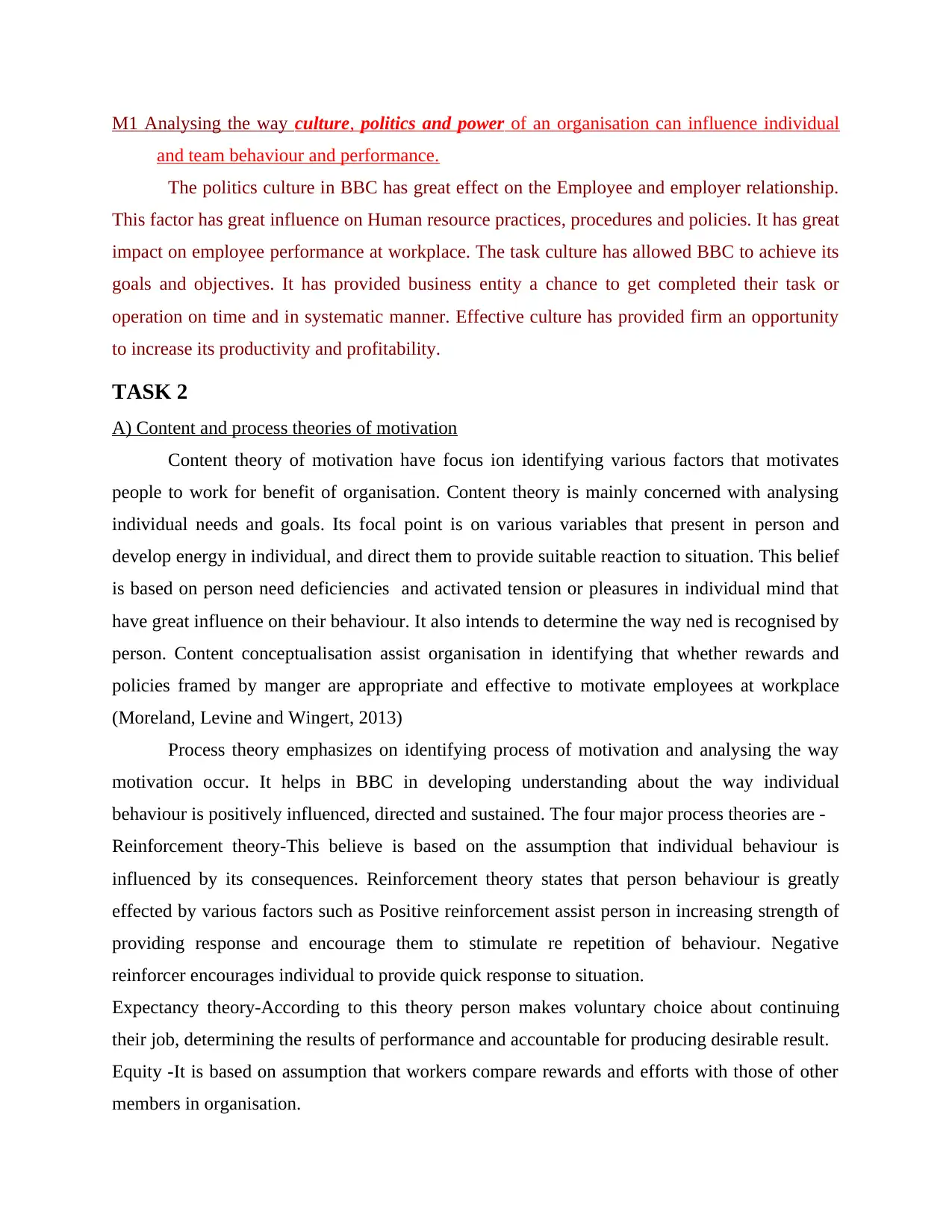
M1 Analysing the way culture, politics and power of an organisation can influence individual
and team behaviour and performance.
The politics culture in BBC has great effect on the Employee and employer relationship.
This factor has great influence on Human resource practices, procedures and policies. It has great
impact on employee performance at workplace. The task culture has allowed BBC to achieve its
goals and objectives. It has provided business entity a chance to get completed their task or
operation on time and in systematic manner. Effective culture has provided firm an opportunity
to increase its productivity and profitability.
TASK 2
A) Content and process theories of motivation
Content theory of motivation have focus ion identifying various factors that motivates
people to work for benefit of organisation. Content theory is mainly concerned with analysing
individual needs and goals. Its focal point is on various variables that present in person and
develop energy in individual, and direct them to provide suitable reaction to situation. This belief
is based on person need deficiencies and activated tension or pleasures in individual mind that
have great influence on their behaviour. It also intends to determine the way ned is recognised by
person. Content conceptualisation assist organisation in identifying that whether rewards and
policies framed by manger are appropriate and effective to motivate employees at workplace
(Moreland, Levine and Wingert, 2013)
Process theory emphasizes on identifying process of motivation and analysing the way
motivation occur. It helps in BBC in developing understanding about the way individual
behaviour is positively influenced, directed and sustained. The four major process theories are -
Reinforcement theory-This believe is based on the assumption that individual behaviour is
influenced by its consequences. Reinforcement theory states that person behaviour is greatly
effected by various factors such as Positive reinforcement assist person in increasing strength of
providing response and encourage them to stimulate re repetition of behaviour. Negative
reinforcer encourages individual to provide quick response to situation.
Expectancy theory-According to this theory person makes voluntary choice about continuing
their job, determining the results of performance and accountable for producing desirable result.
Equity -It is based on assumption that workers compare rewards and efforts with those of other
members in organisation.
and team behaviour and performance.
The politics culture in BBC has great effect on the Employee and employer relationship.
This factor has great influence on Human resource practices, procedures and policies. It has great
impact on employee performance at workplace. The task culture has allowed BBC to achieve its
goals and objectives. It has provided business entity a chance to get completed their task or
operation on time and in systematic manner. Effective culture has provided firm an opportunity
to increase its productivity and profitability.
TASK 2
A) Content and process theories of motivation
Content theory of motivation have focus ion identifying various factors that motivates
people to work for benefit of organisation. Content theory is mainly concerned with analysing
individual needs and goals. Its focal point is on various variables that present in person and
develop energy in individual, and direct them to provide suitable reaction to situation. This belief
is based on person need deficiencies and activated tension or pleasures in individual mind that
have great influence on their behaviour. It also intends to determine the way ned is recognised by
person. Content conceptualisation assist organisation in identifying that whether rewards and
policies framed by manger are appropriate and effective to motivate employees at workplace
(Moreland, Levine and Wingert, 2013)
Process theory emphasizes on identifying process of motivation and analysing the way
motivation occur. It helps in BBC in developing understanding about the way individual
behaviour is positively influenced, directed and sustained. The four major process theories are -
Reinforcement theory-This believe is based on the assumption that individual behaviour is
influenced by its consequences. Reinforcement theory states that person behaviour is greatly
effected by various factors such as Positive reinforcement assist person in increasing strength of
providing response and encourage them to stimulate re repetition of behaviour. Negative
reinforcer encourages individual to provide quick response to situation.
Expectancy theory-According to this theory person makes voluntary choice about continuing
their job, determining the results of performance and accountable for producing desirable result.
Equity -It is based on assumption that workers compare rewards and efforts with those of other
members in organisation.
Paraphrase This Document
Need a fresh take? Get an instant paraphrase of this document with our AI Paraphraser
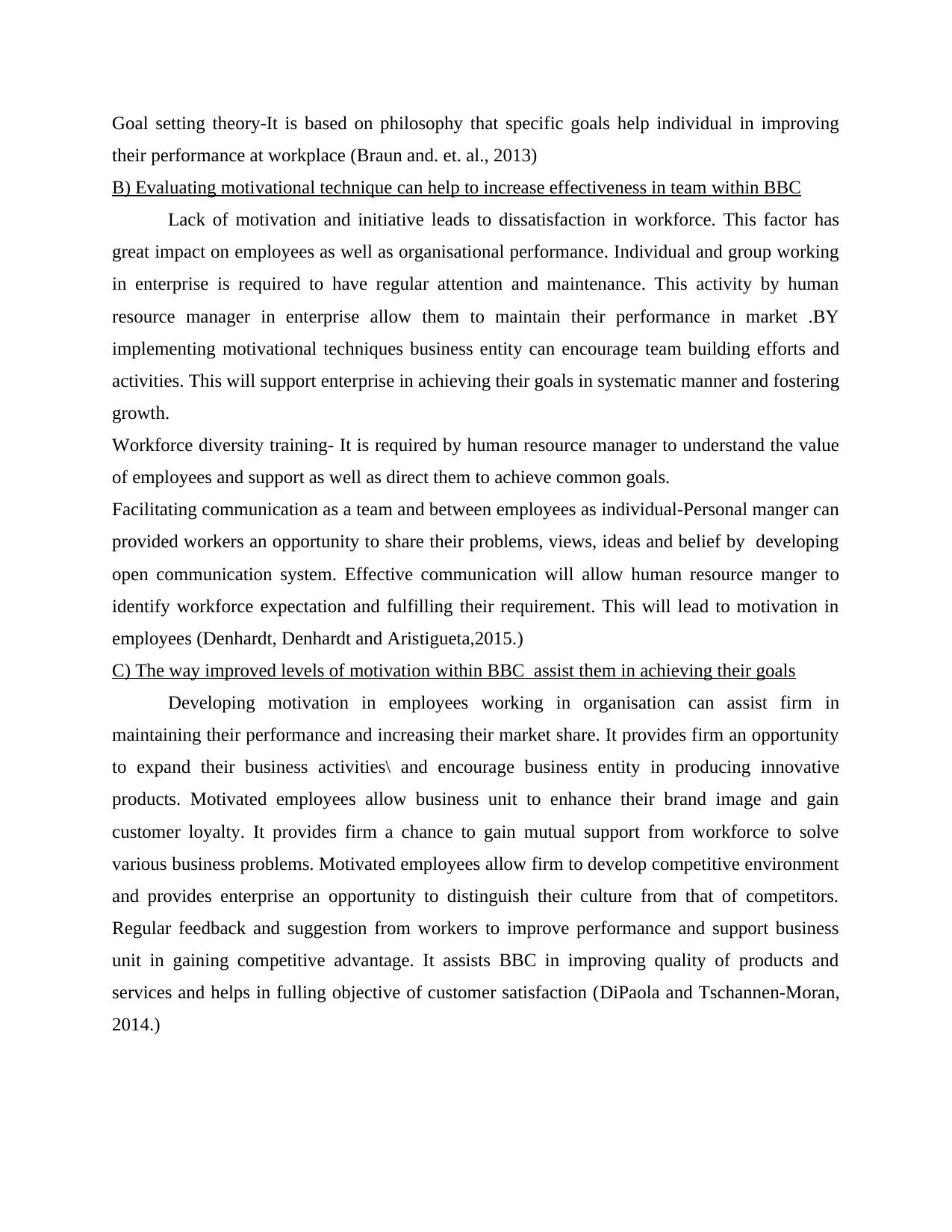
Goal setting theory-It is based on philosophy that specific goals help individual in improving
their performance at workplace (Braun and. et. al., 2013)
B) Evaluating motivational technique can help to increase effectiveness in team within BBC
Lack of motivation and initiative leads to dissatisfaction in workforce. This factor has
great impact on employees as well as organisational performance. Individual and group working
in enterprise is required to have regular attention and maintenance. This activity by human
resource manager in enterprise allow them to maintain their performance in market .BY
implementing motivational techniques business entity can encourage team building efforts and
activities. This will support enterprise in achieving their goals in systematic manner and fostering
growth.
Workforce diversity training- It is required by human resource manager to understand the value
of employees and support as well as direct them to achieve common goals.
Facilitating communication as a team and between employees as individual-Personal manger can
provided workers an opportunity to share their problems, views, ideas and belief by developing
open communication system. Effective communication will allow human resource manger to
identify workforce expectation and fulfilling their requirement. This will lead to motivation in
employees (Denhardt, Denhardt and Aristigueta,2015.)
C) The way improved levels of motivation within BBC assist them in achieving their goals
Developing motivation in employees working in organisation can assist firm in
maintaining their performance and increasing their market share. It provides firm an opportunity
to expand their business activities\ and encourage business entity in producing innovative
products. Motivated employees allow business unit to enhance their brand image and gain
customer loyalty. It provides firm a chance to gain mutual support from workforce to solve
various business problems. Motivated employees allow firm to develop competitive environment
and provides enterprise an opportunity to distinguish their culture from that of competitors.
Regular feedback and suggestion from workers to improve performance and support business
unit in gaining competitive advantage. It assists BBC in improving quality of products and
services and helps in fulling objective of customer satisfaction (DiPaola and Tschannen-Moran,
2014.)
their performance at workplace (Braun and. et. al., 2013)
B) Evaluating motivational technique can help to increase effectiveness in team within BBC
Lack of motivation and initiative leads to dissatisfaction in workforce. This factor has
great impact on employees as well as organisational performance. Individual and group working
in enterprise is required to have regular attention and maintenance. This activity by human
resource manager in enterprise allow them to maintain their performance in market .BY
implementing motivational techniques business entity can encourage team building efforts and
activities. This will support enterprise in achieving their goals in systematic manner and fostering
growth.
Workforce diversity training- It is required by human resource manager to understand the value
of employees and support as well as direct them to achieve common goals.
Facilitating communication as a team and between employees as individual-Personal manger can
provided workers an opportunity to share their problems, views, ideas and belief by developing
open communication system. Effective communication will allow human resource manger to
identify workforce expectation and fulfilling their requirement. This will lead to motivation in
employees (Denhardt, Denhardt and Aristigueta,2015.)
C) The way improved levels of motivation within BBC assist them in achieving their goals
Developing motivation in employees working in organisation can assist firm in
maintaining their performance and increasing their market share. It provides firm an opportunity
to expand their business activities\ and encourage business entity in producing innovative
products. Motivated employees allow business unit to enhance their brand image and gain
customer loyalty. It provides firm a chance to gain mutual support from workforce to solve
various business problems. Motivated employees allow firm to develop competitive environment
and provides enterprise an opportunity to distinguish their culture from that of competitors.
Regular feedback and suggestion from workers to improve performance and support business
unit in gaining competitive advantage. It assists BBC in improving quality of products and
services and helps in fulling objective of customer satisfaction (DiPaola and Tschannen-Moran,
2014.)
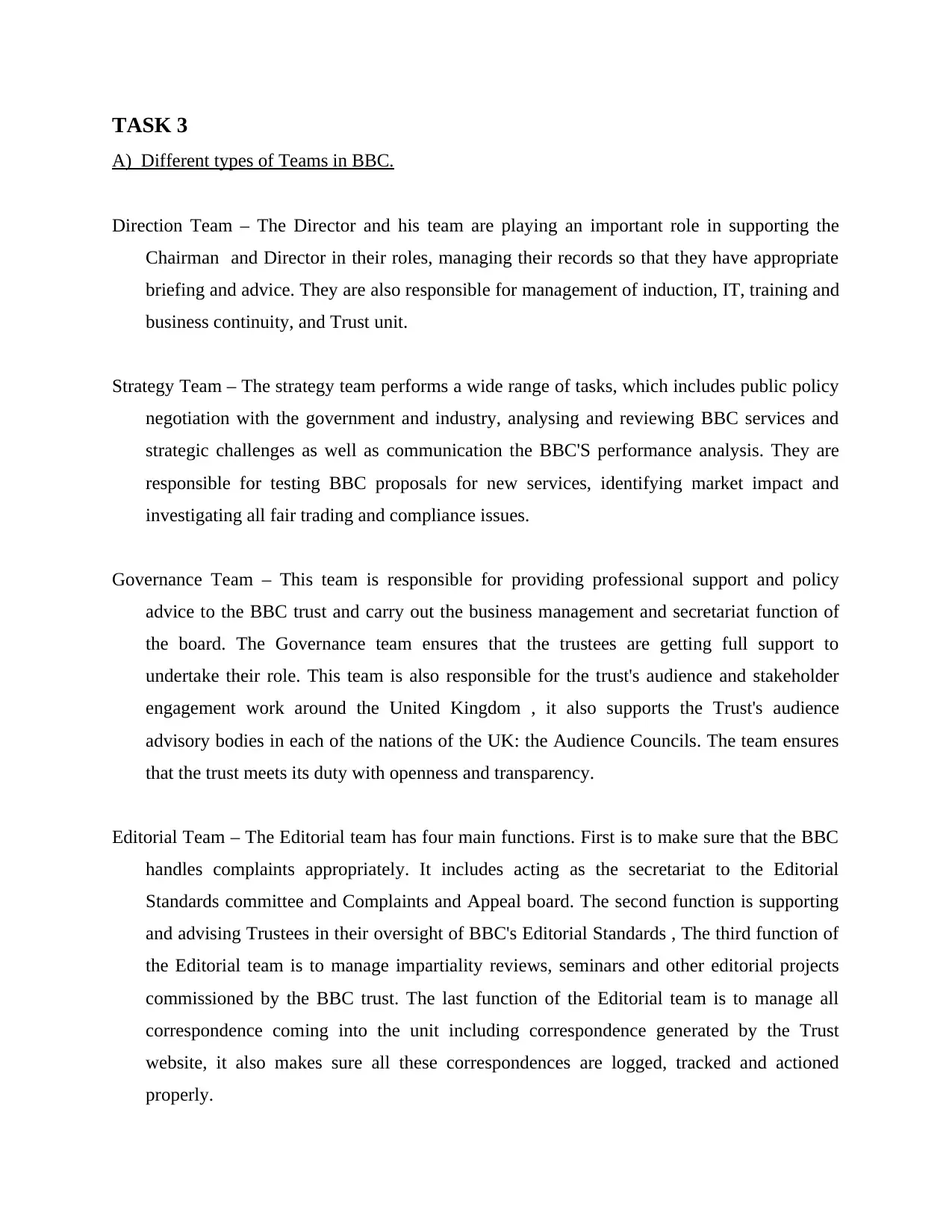
TASK 3
A) Different types of Teams in BBC.
Direction Team – The Director and his team are playing an important role in supporting the
Chairman and Director in their roles, managing their records so that they have appropriate
briefing and advice. They are also responsible for management of induction, IT, training and
business continuity, and Trust unit.
Strategy Team – The strategy team performs a wide range of tasks, which includes public policy
negotiation with the government and industry, analysing and reviewing BBC services and
strategic challenges as well as communication the BBC'S performance analysis. They are
responsible for testing BBC proposals for new services, identifying market impact and
investigating all fair trading and compliance issues.
Governance Team – This team is responsible for providing professional support and policy
advice to the BBC trust and carry out the business management and secretariat function of
the board. The Governance team ensures that the trustees are getting full support to
undertake their role. This team is also responsible for the trust's audience and stakeholder
engagement work around the United Kingdom , it also supports the Trust's audience
advisory bodies in each of the nations of the UK: the Audience Councils. The team ensures
that the trust meets its duty with openness and transparency.
Editorial Team – The Editorial team has four main functions. First is to make sure that the BBC
handles complaints appropriately. It includes acting as the secretariat to the Editorial
Standards committee and Complaints and Appeal board. The second function is supporting
and advising Trustees in their oversight of BBC's Editorial Standards , The third function of
the Editorial team is to manage impartiality reviews, seminars and other editorial projects
commissioned by the BBC trust. The last function of the Editorial team is to manage all
correspondence coming into the unit including correspondence generated by the Trust
website, it also makes sure all these correspondences are logged, tracked and actioned
properly.
A) Different types of Teams in BBC.
Direction Team – The Director and his team are playing an important role in supporting the
Chairman and Director in their roles, managing their records so that they have appropriate
briefing and advice. They are also responsible for management of induction, IT, training and
business continuity, and Trust unit.
Strategy Team – The strategy team performs a wide range of tasks, which includes public policy
negotiation with the government and industry, analysing and reviewing BBC services and
strategic challenges as well as communication the BBC'S performance analysis. They are
responsible for testing BBC proposals for new services, identifying market impact and
investigating all fair trading and compliance issues.
Governance Team – This team is responsible for providing professional support and policy
advice to the BBC trust and carry out the business management and secretariat function of
the board. The Governance team ensures that the trustees are getting full support to
undertake their role. This team is also responsible for the trust's audience and stakeholder
engagement work around the United Kingdom , it also supports the Trust's audience
advisory bodies in each of the nations of the UK: the Audience Councils. The team ensures
that the trust meets its duty with openness and transparency.
Editorial Team – The Editorial team has four main functions. First is to make sure that the BBC
handles complaints appropriately. It includes acting as the secretariat to the Editorial
Standards committee and Complaints and Appeal board. The second function is supporting
and advising Trustees in their oversight of BBC's Editorial Standards , The third function of
the Editorial team is to manage impartiality reviews, seminars and other editorial projects
commissioned by the BBC trust. The last function of the Editorial team is to manage all
correspondence coming into the unit including correspondence generated by the Trust
website, it also makes sure all these correspondences are logged, tracked and actioned
properly.
⊘ This is a preview!⊘
Do you want full access?
Subscribe today to unlock all pages.

Trusted by 1+ million students worldwide
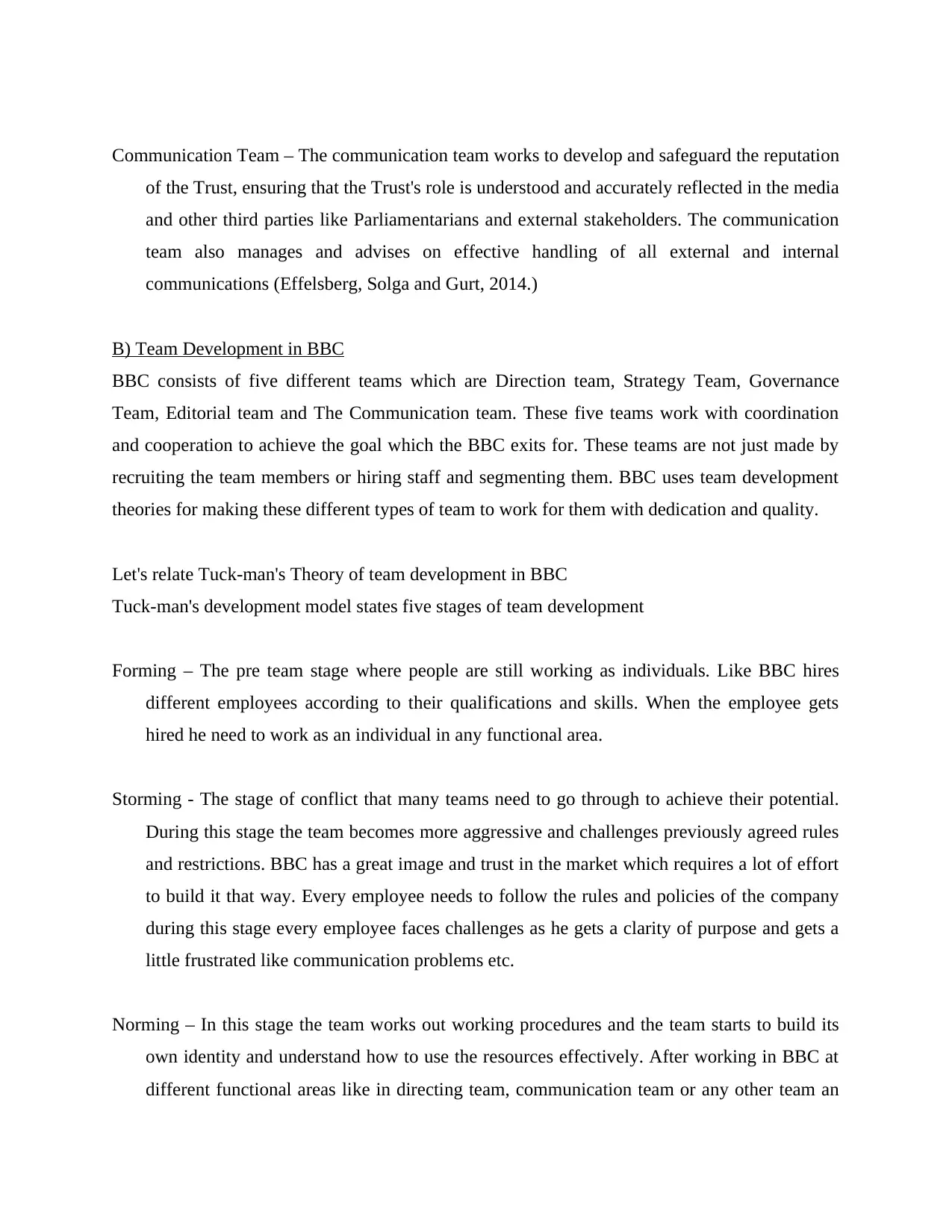
Communication Team – The communication team works to develop and safeguard the reputation
of the Trust, ensuring that the Trust's role is understood and accurately reflected in the media
and other third parties like Parliamentarians and external stakeholders. The communication
team also manages and advises on effective handling of all external and internal
communications (Effelsberg, Solga and Gurt, 2014.)
B) Team Development in BBC
BBC consists of five different teams which are Direction team, Strategy Team, Governance
Team, Editorial team and The Communication team. These five teams work with coordination
and cooperation to achieve the goal which the BBC exits for. These teams are not just made by
recruiting the team members or hiring staff and segmenting them. BBC uses team development
theories for making these different types of team to work for them with dedication and quality.
Let's relate Tuck-man's Theory of team development in BBC
Tuck-man's development model states five stages of team development
Forming – The pre team stage where people are still working as individuals. Like BBC hires
different employees according to their qualifications and skills. When the employee gets
hired he need to work as an individual in any functional area.
Storming - The stage of conflict that many teams need to go through to achieve their potential.
During this stage the team becomes more aggressive and challenges previously agreed rules
and restrictions. BBC has a great image and trust in the market which requires a lot of effort
to build it that way. Every employee needs to follow the rules and policies of the company
during this stage every employee faces challenges as he gets a clarity of purpose and gets a
little frustrated like communication problems etc.
Norming – In this stage the team works out working procedures and the team starts to build its
own identity and understand how to use the resources effectively. After working in BBC at
different functional areas like in directing team, communication team or any other team an
of the Trust, ensuring that the Trust's role is understood and accurately reflected in the media
and other third parties like Parliamentarians and external stakeholders. The communication
team also manages and advises on effective handling of all external and internal
communications (Effelsberg, Solga and Gurt, 2014.)
B) Team Development in BBC
BBC consists of five different teams which are Direction team, Strategy Team, Governance
Team, Editorial team and The Communication team. These five teams work with coordination
and cooperation to achieve the goal which the BBC exits for. These teams are not just made by
recruiting the team members or hiring staff and segmenting them. BBC uses team development
theories for making these different types of team to work for them with dedication and quality.
Let's relate Tuck-man's Theory of team development in BBC
Tuck-man's development model states five stages of team development
Forming – The pre team stage where people are still working as individuals. Like BBC hires
different employees according to their qualifications and skills. When the employee gets
hired he need to work as an individual in any functional area.
Storming - The stage of conflict that many teams need to go through to achieve their potential.
During this stage the team becomes more aggressive and challenges previously agreed rules
and restrictions. BBC has a great image and trust in the market which requires a lot of effort
to build it that way. Every employee needs to follow the rules and policies of the company
during this stage every employee faces challenges as he gets a clarity of purpose and gets a
little frustrated like communication problems etc.
Norming – In this stage the team works out working procedures and the team starts to build its
own identity and understand how to use the resources effectively. After working in BBC at
different functional areas like in directing team, communication team or any other team an
Paraphrase This Document
Need a fresh take? Get an instant paraphrase of this document with our AI Paraphraser
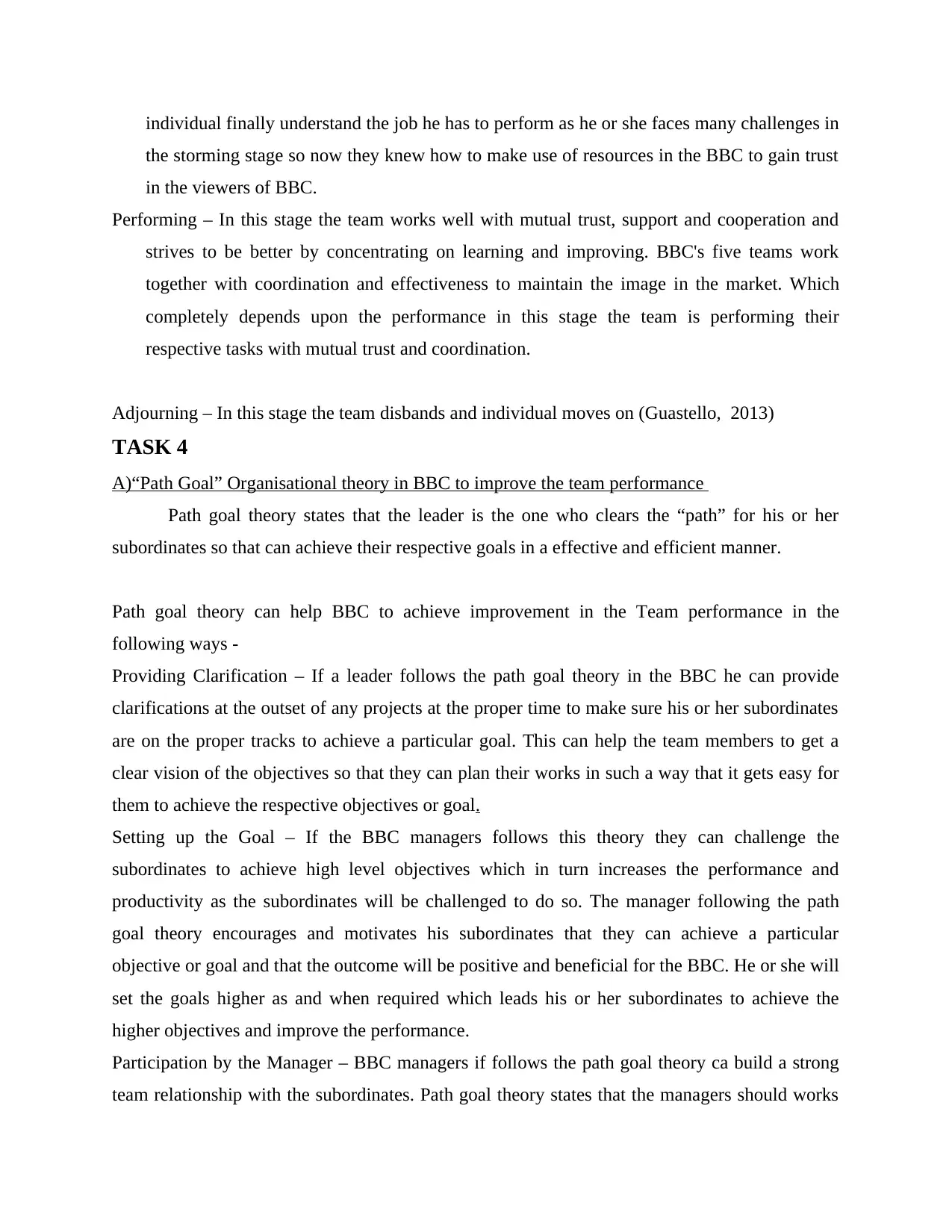
individual finally understand the job he has to perform as he or she faces many challenges in
the storming stage so now they knew how to make use of resources in the BBC to gain trust
in the viewers of BBC.
Performing – In this stage the team works well with mutual trust, support and cooperation and
strives to be better by concentrating on learning and improving. BBC's five teams work
together with coordination and effectiveness to maintain the image in the market. Which
completely depends upon the performance in this stage the team is performing their
respective tasks with mutual trust and coordination.
Adjourning – In this stage the team disbands and individual moves on (Guastello, 2013)
TASK 4
A)“Path Goal” Organisational theory in BBC to improve the team performance
Path goal theory states that the leader is the one who clears the “path” for his or her
subordinates so that can achieve their respective goals in a effective and efficient manner.
Path goal theory can help BBC to achieve improvement in the Team performance in the
following ways -
Providing Clarification – If a leader follows the path goal theory in the BBC he can provide
clarifications at the outset of any projects at the proper time to make sure his or her subordinates
are on the proper tracks to achieve a particular goal. This can help the team members to get a
clear vision of the objectives so that they can plan their works in such a way that it gets easy for
them to achieve the respective objectives or goal.
Setting up the Goal – If the BBC managers follows this theory they can challenge the
subordinates to achieve high level objectives which in turn increases the performance and
productivity as the subordinates will be challenged to do so. The manager following the path
goal theory encourages and motivates his subordinates that they can achieve a particular
objective or goal and that the outcome will be positive and beneficial for the BBC. He or she will
set the goals higher as and when required which leads his or her subordinates to achieve the
higher objectives and improve the performance.
Participation by the Manager – BBC managers if follows the path goal theory ca build a strong
team relationship with the subordinates. Path goal theory states that the managers should works
the storming stage so now they knew how to make use of resources in the BBC to gain trust
in the viewers of BBC.
Performing – In this stage the team works well with mutual trust, support and cooperation and
strives to be better by concentrating on learning and improving. BBC's five teams work
together with coordination and effectiveness to maintain the image in the market. Which
completely depends upon the performance in this stage the team is performing their
respective tasks with mutual trust and coordination.
Adjourning – In this stage the team disbands and individual moves on (Guastello, 2013)
TASK 4
A)“Path Goal” Organisational theory in BBC to improve the team performance
Path goal theory states that the leader is the one who clears the “path” for his or her
subordinates so that can achieve their respective goals in a effective and efficient manner.
Path goal theory can help BBC to achieve improvement in the Team performance in the
following ways -
Providing Clarification – If a leader follows the path goal theory in the BBC he can provide
clarifications at the outset of any projects at the proper time to make sure his or her subordinates
are on the proper tracks to achieve a particular goal. This can help the team members to get a
clear vision of the objectives so that they can plan their works in such a way that it gets easy for
them to achieve the respective objectives or goal.
Setting up the Goal – If the BBC managers follows this theory they can challenge the
subordinates to achieve high level objectives which in turn increases the performance and
productivity as the subordinates will be challenged to do so. The manager following the path
goal theory encourages and motivates his subordinates that they can achieve a particular
objective or goal and that the outcome will be positive and beneficial for the BBC. He or she will
set the goals higher as and when required which leads his or her subordinates to achieve the
higher objectives and improve the performance.
Participation by the Manager – BBC managers if follows the path goal theory ca build a strong
team relationship with the subordinates. Path goal theory states that the managers should works
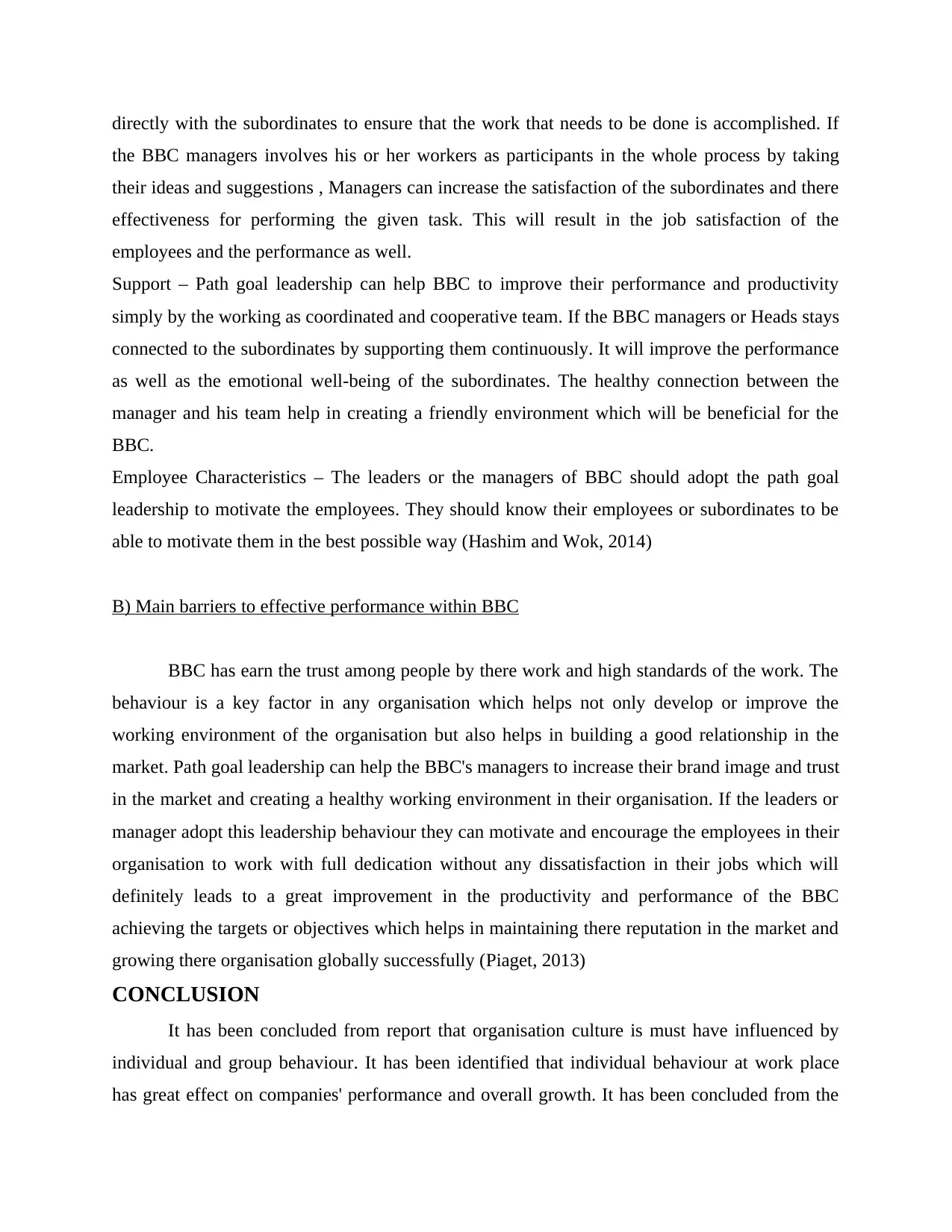
directly with the subordinates to ensure that the work that needs to be done is accomplished. If
the BBC managers involves his or her workers as participants in the whole process by taking
their ideas and suggestions , Managers can increase the satisfaction of the subordinates and there
effectiveness for performing the given task. This will result in the job satisfaction of the
employees and the performance as well.
Support – Path goal leadership can help BBC to improve their performance and productivity
simply by the working as coordinated and cooperative team. If the BBC managers or Heads stays
connected to the subordinates by supporting them continuously. It will improve the performance
as well as the emotional well-being of the subordinates. The healthy connection between the
manager and his team help in creating a friendly environment which will be beneficial for the
BBC.
Employee Characteristics – The leaders or the managers of BBC should adopt the path goal
leadership to motivate the employees. They should know their employees or subordinates to be
able to motivate them in the best possible way (Hashim and Wok, 2014)
B) Main barriers to effective performance within BBC
BBC has earn the trust among people by there work and high standards of the work. The
behaviour is a key factor in any organisation which helps not only develop or improve the
working environment of the organisation but also helps in building a good relationship in the
market. Path goal leadership can help the BBC's managers to increase their brand image and trust
in the market and creating a healthy working environment in their organisation. If the leaders or
manager adopt this leadership behaviour they can motivate and encourage the employees in their
organisation to work with full dedication without any dissatisfaction in their jobs which will
definitely leads to a great improvement in the productivity and performance of the BBC
achieving the targets or objectives which helps in maintaining there reputation in the market and
growing there organisation globally successfully (Piaget, 2013)
CONCLUSION
It has been concluded from report that organisation culture is must have influenced by
individual and group behaviour. It has been identified that individual behaviour at work place
has great effect on companies' performance and overall growth. It has been concluded from the
the BBC managers involves his or her workers as participants in the whole process by taking
their ideas and suggestions , Managers can increase the satisfaction of the subordinates and there
effectiveness for performing the given task. This will result in the job satisfaction of the
employees and the performance as well.
Support – Path goal leadership can help BBC to improve their performance and productivity
simply by the working as coordinated and cooperative team. If the BBC managers or Heads stays
connected to the subordinates by supporting them continuously. It will improve the performance
as well as the emotional well-being of the subordinates. The healthy connection between the
manager and his team help in creating a friendly environment which will be beneficial for the
BBC.
Employee Characteristics – The leaders or the managers of BBC should adopt the path goal
leadership to motivate the employees. They should know their employees or subordinates to be
able to motivate them in the best possible way (Hashim and Wok, 2014)
B) Main barriers to effective performance within BBC
BBC has earn the trust among people by there work and high standards of the work. The
behaviour is a key factor in any organisation which helps not only develop or improve the
working environment of the organisation but also helps in building a good relationship in the
market. Path goal leadership can help the BBC's managers to increase their brand image and trust
in the market and creating a healthy working environment in their organisation. If the leaders or
manager adopt this leadership behaviour they can motivate and encourage the employees in their
organisation to work with full dedication without any dissatisfaction in their jobs which will
definitely leads to a great improvement in the productivity and performance of the BBC
achieving the targets or objectives which helps in maintaining there reputation in the market and
growing there organisation globally successfully (Piaget, 2013)
CONCLUSION
It has been concluded from report that organisation culture is must have influenced by
individual and group behaviour. It has been identified that individual behaviour at work place
has great effect on companies' performance and overall growth. It has been concluded from the
⊘ This is a preview!⊘
Do you want full access?
Subscribe today to unlock all pages.

Trusted by 1+ million students worldwide
1 out of 15
Related Documents
Your All-in-One AI-Powered Toolkit for Academic Success.
+13062052269
info@desklib.com
Available 24*7 on WhatsApp / Email
![[object Object]](/_next/static/media/star-bottom.7253800d.svg)
Unlock your academic potential
Copyright © 2020–2026 A2Z Services. All Rights Reserved. Developed and managed by ZUCOL.





